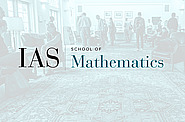2006-2007 seminars
Feb
06
2007
Feb
05
2007
Computer Science/Discrete Mathematics Seminar I
Integral Lexicographic Codes
John Conway
3:15pm|S-101
Jan
30
2007
Computer Science/Discrete Mathematics Seminar II
On Approximate Majority and Probabilistic Time
10:30am|S-101
Jan
29
2007
Computer Science/Discrete Mathematics Seminar I
Secure Multipary Quantum Computation
Michael Ben-Or
11:15am|S-101
Jan
23
2007
Computer Science/Discrete Mathematics Seminar II
The Polynomial Identity Testing Problem
10:30am|West Building Lecture Theatre
Jan
22
2007
Computer Science/Discrete Mathematics Seminar I
On the Condition Number of a Randomly Perturbed Matrix
11:15am|West Building Lecture Theatre
Jan
16
2007
Computer Science/Discrete Mathematics Seminar II
An Elementary Construction of Constant-Degree Expanders
Oded Schwartz
10:30am|S-101
Jan
15
2007
Computer Science/Discrete Mathematics Seminar I
How to Rank with Few Errors: A PTAS for Weighted Feedback Arc Set on Tournaments
Warren Schudy
11:15am|S-101
Dec
19
2006
Computer Science/Discrete Mathematics Seminar II
Sum-Product Estimates, Expanders, and Sieving
Alex Gamburd
10:30am|S-101
Dec
18
2006
Computer Science/Discrete Mathematics Seminar I
On the Computation and Approximation of Two-Player Nash Equilibria
11:15am|S-101
